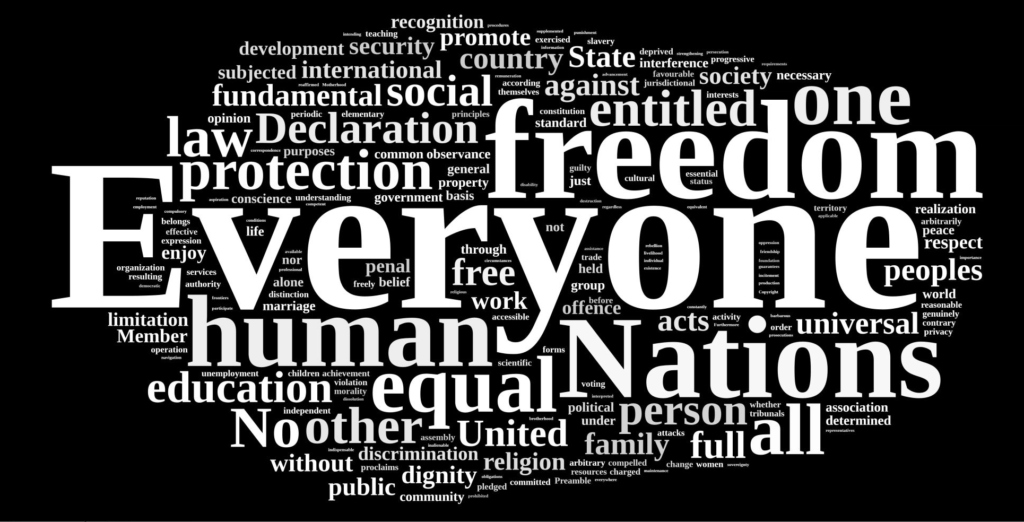Featured image courtesy David D Kim
December 10 is Human Rights Day, and marks 70 years since the Universal Declaration of Human Rights was adopted.
Since inception, Groundviews has dedicated itself to discussion on issues pertaining to human rights. The following is a selection of content from the site, juxtaposed with the relevant articles from the Universal Declaration of Human Rights.
This list is by no means exhaustive, but is an attempt to cover the many different ways in which Sri Lanka has grappled with rights issues, over decades.
Article 1.
“All human beings are born free and equal in dignity and rights.” Yet, in Sri Lanka, discrimination along lines of caste persists.
Article 2.
“Everyone is entitled to all the rights and freedoms set forth in this Declaration, without distinction of any kind, such as race, colour, sex, language, religion, political or other opinion. Let’s examine how Sri Lanka’s divisions along lines of race, religion, sex and language has led to exclusion.”
On language: Read here on how Sri Lankans continue to be impacted by violations of our language policy.
On gender: Read here on how Sri Lanka’s ‘pandemic’ of sexual violence impacts women, everyday, on unpaid care work – the hidden barrier to female participation in the workforce, and on barriers to female political representation.
On gender identity: Read here on the continued discrimination against members of the LGBTIQ community, even as countries in the region move towards decriminalization.
Article 3.
Everyone has the right to life, liberty and security – read a discussion on whether or not it is a fundamental right here. Also read this on Sri Lanka’s history grappling with capital punishment here.
Article 5.
No one shall be subjected to torture or to cruel, inhuman or degrading treatment or punishment. Read about Sri Lanka’s broken system and the ongoing use of torture, even post-2015, here and here.
Article 9.
No one shall be subjected to arbitrary arrest, detention or exile. Read about the legacy of the PTA here, here and here.
Article 12.
No one shall be subjected to arbitrary interference with his privacy, family, home or correspondence, nor to attacks upon his honour and reputation. Read about the privacy implications of the e-NIC project here and concerns raised on surveillance here.
Article 14.
Everyone has the right to seek and to enjoy in other countries asylum from persecution.
Read about Sri Lanka’s treatment of refugees here and here.
Article 15.
Everyone has the right to a nationality. Read about the estate community, disenfranchised under the Citizenship Act of 1948, and still one of the most marginalised communities in the island here.
Article 16.
Men and women of full age, without any limitation due to race, nationality or religion, have the right to marry and to found a family. They are entitled to equal rights as to marriage, during marriage and at its dissolution.
Read about the struggle to reform Muslim personal laws, and the impact the current Muslim Marriage and Divorce Act has had on the community here.
Article 17.
(1) Everyone has the right to own property alone as well as in association with others.
(2) No one shall be arbitrarily deprived of his property.
Read the many ways communities across Sri Lanka, from Colombo to Jaffna, have been deprived of land here, here, here and here.
Article 18.
Everyone has the right to freedom of thought, conscience and religion.
Read about attacks on minority religions, especially the Muslim community, including most recently during violent riots in Digana here. Read here about how this discrimination has resulted in violence in the past here and here.
Article 19.
Everyone has the right to freedom of opinion and expression. Read a recent piece on the shrinking of space for freedom of expression here. See a selection of content on freedom of expression here.
Article 20.
Everyone has the right to freedom of peaceful assembly and association. Read here on the protest in Weliweriya where that right was tragically and violently disrupted.
Article 22.
Everyone, as a member of society, has the right to social security and is entitled to realization…of economic, social and cultural rights – Read a discussion on the inclusion of socio-economic rights in Sri Lanka’s constitutional reform process here.
Article 23.
Everyone has the right to work, to free choice of employment, to just and favourable conditions of work and to protection against unemployment. Read a piece on Sri Lanka Telecom’s mistreatment of its contract workers here.
Article 26.
Everyone has the right to education. Sri Lanka has a high literacy rate and free education, but read how some children are excluded with the incident of a Kuliyapitiya schoolchild here. Read here on the barriers that members of the Malaiyagha community face in ensuring their children receive education.
Article 27.
Everyone has the right freely to participate in the cultural life of the community, to enjoy the arts and to share in scientific advancement and its benefits.
Read how the pursuit and preservation of culture has sometimes come at the expense of minorities here.
How can we look for and work towards a better understanding and preservation of fundamental human rights? This piece by Savitri Hensman has some food for thought:
“A focus on human rights as a whole, for everyone, may have a chance of bringing together a broad cross-section of society.
“The challenges of building an ethos of rights for all should not be underestimated,” she adds, “But if those too young to have lived through the events of July 1983 and their aftermath are to be spared such horrors, it may be necessary to work towards a recognition that all deserve basic freedoms, recognition of human dignity and the necessities of life.”
